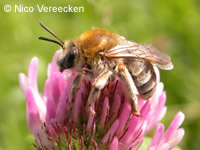Researchers reveal decline in wild bees and the flowers they pollinate
A team of European researchers has uncovered evidence of a widespread decline in the diversity of both bees and the flowers they pollinate. Scientists from the UK, Netherlands and Germany looked at biodiversity records for hundreds of sites, and found that bee diversity fell in almost 80 per cent of them. While previous research has highlighted drops in bee diversity at small numbers of sites, this is the first study to demonstrate a large-scale fall in bee diversity. Furthermore, the decline in bee diversity is matched by a parallel decline in wildflowers which require insects for pollination. At the same time, populations of wind and self pollinating plants have either stayed the same or increased. The researchers are now hoping to clarify whether the bee decline is causing the wildflower decline, or vice-versa, or whether in fact the two are locked in a vicious circle of decline. 'Whatever the cause, the study provides a worrying suggestion that declines in some species may trigger a cascade of local extinctions amongst other associated species,' commented Dr Koos Biesmeijer of the University of Leeds. The decline in bee numbers could have severe implications for the agricultural sector. 'The economic value of pollination worldwide is thought to be between ¿30 and 73 billion per year,' said Dr Simon Potts of the University of Reading. The most recent figures for the EU are from 1989, when the EU had just 12 members. Even then, pollination by honeybees of just 30 crops was estimated to be worth ¿4.25 billion per year. Research is now underway to update this information. It has been estimated that some 84 per cent of European crops are directly dependent on insects for their pollination. These include many fruits and vegetables, as well as nuts, seeds and herbs. The consequences of falling bee diversity would not be so severe if similar insect species, capable of pollinating the same plant species, survived. Unfortunately, the research revealed that in fact insects which pollinate a small range of flower species or have specialised habitat needs are those most likely to be lost. In effect, this means that a small number of generalist pollinators are replacing a larger number of rarer specialist species. According to Dr Biesmeijer, the findings have serious implications. 'If this pattern is replicated elsewhere, the 'pollinator services' we take for granted could be at risk,' he warned. 'And with it the future for the plants we enjoy in our countryside.'
Countries
Germany, Netherlands, United Kingdom



